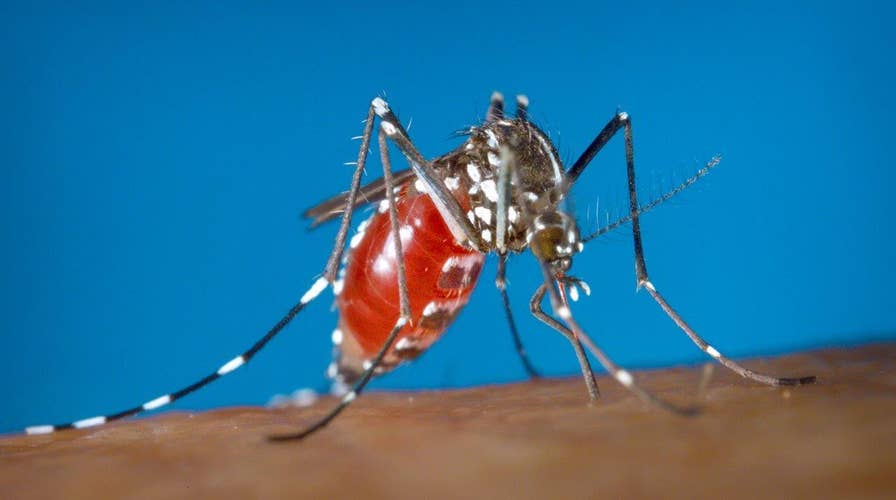New concerns over Zika virus cases growing in the US
Mosquito-borne virus linked to birth defects; Dr. Marc Siegel weighs in on 'America's Newsroom'
CHICAGO – U.S. doctors are fielding a spate of calls from expectant mothers who recently traveled to countries affected by the Zika virus and fear possible exposure to the mosquito-borne infection linked to a spike in fetal brain damage in Brazil.
New U.S. treatment guidelines only recommend blood tests for pregnant women with symptoms of infection. But 80 percent of Zika patients show no symptoms, leaving many women no way to know early enough to make an informed choice about their unborn children, leading obstetricians told Reuters this week.
"These effects are not necessarily going to be seen at a time when the mother can decide to terminate the pregnancy," said Dr. Natalie Meirowitz of Long Island Jewish Medical Center.
The U.S. Centers for Disease Control and Prevention is advising pregnant women not to travel to 22 countries and territories in Latin America and the Caribbean where the Zika virus causing infections. The agency added eight of those countries to the list on Friday.
Brazil said the number of babies born with microcephaly, a condition marked by an unusually small head, rose 10 percent to 3,893 over a period of 10 days. El Salvador officials have urged women to avoid getting pregnant until 2018 due to Zika.
The American College of Obstetricians and Gynecologists estimates its members have received "hundreds, if not thousands" of calls from patients who had traveled to affected regions, a spokeswoman said.
"It's consuming our lives," said Dr. Laura Riley, president of the Society for Maternal-Fetal Medicine and a specialist in high-risk pregnancies at Massachusetts General Hospital.
The CDC is trying to determine how many pregnant women may have traveled to affected regions in the past several months. The agency issued interim guidelines this week advising doctors to administer blood tests only for pregnant women with symptoms.
Some doctors are concerned that the guidelines mean other pregnant women who are at risk would not be identified. That is because 80 percent of people infected by Zika never have symptoms.
For asymptomatic women, the CDC recommends ultrasounds to check for microcephaly in the fetus, looking for underdeveloped heads or calcium deposits in the brain. But microcephaly typically does not become apparent on ultrasounds until later in pregnancies, often after the 24th week when many U.S. states prohibit abortion.
"That's the toughest situation that we have with the guidelines right now," said Dr. Emily Landon, an infectious disease expert at the University of Chicago Medical Center, referring to the testing recommendations. "We know women can become asymptomatic and still have Zika."
LIMITS TO TESTING
With no commercially available Zika tests, only the CDC and some state health laboratories are equipped to detect the virus. Riley, who advised the agency on its guidelines, said testing every woman who visited or lived in affected countries during the outbreak period could "flood the CDC."
Dr. Denise Jamieson of the CDC, who helped write the guidelines, said lab capacity was just one factor in the decision to only test pregnant women with symptoms. The biggest concerns, she said, were that the tests are hard to interpret and prone to false positive results, which could lead to decisions based on inaccurate information.
Jamieson said the guidelines will be reviewed for their effectiveness.
Riley stressed that asymptomatic women will be offered ultrasounds.
"Ultimately, what patients want to know is whether their baby's brain has been affected," said Riley. "You aren't going to know that without the ultrasound."
The main benefit of testing is to put at ease women at ease, said Scott Weaver, an expert in mosquito-borne diseases at the University of Texas Medical Branch.
A positive test result for Zika in a pregnant woman does not necessarily mean a baby will develop microcephaly, Landon said. Additional ultrasounds would be necessary, and even those may not show evidence of a problem early enough for a woman to take action.
No therapy is available for an infected fetus that has developed microcephaly, obstetricians said.
Meirowitz recently saw a patient who had vacationed in Puerto Rico during her seventh week of pregnancy, and recalls getting a mosquito bite. Because the woman, now 20 weeks pregnant, never got sick, she was not offered a blood test.
"We ruled out microcephaly" after doing an ultrasound, but still had concerns, Meirowitz said. "We know from other viruses that you may not see ultrasound findings showing fetal infection right away, particularly microcephaly. That is what's so difficult."





















